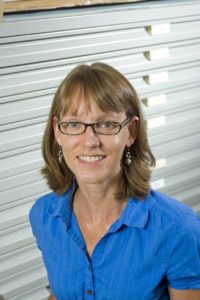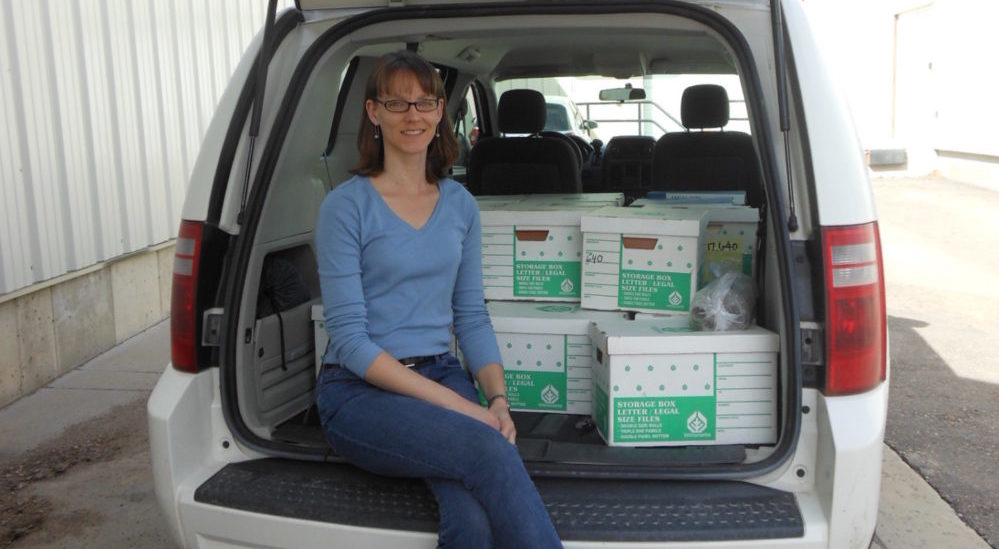Editor’s note: The Provost’s Council for Engagement is made up of a dozen faculty members representing all eight colleges and Morgan Library. Council members serve as champions for advancing the practice and recognition of engaged scholarship as fully embedded within CSU’s core teaching, research and service missions.
Each month we are profiling a different member of the council, who will in their own words help showcase the diversity of engaged scholarship across campus, as well as the impact of this work on communities and the university. So far, seven of the council members – Martin Carcasson, Christine Fruhauf, Neil Grigg, Bill Shuster, Robin Reid, Frank Garry and Tracy Nelson – have been profiled.
This month we meet Patty Rettig, associate professor and head archivist in the Water Resources Archive, University Libraries. Rettig has built the archive to hold over 100 distinct collections documenting Colorado’s water heritage by engaging with the water community across the state. This involves working with people throughout the university as well as with state and federal agencies, ditch companies, businesses, and individuals.
What, in your opinion, is “faculty engagement”?
I like to think of faculty engagement as being a bridge between the university and the community in order to share expertise — in both directions, a two-way street — and solve problems. When conversations are fostered and various parties listen to each other, mutual benefits can arise for both the university and the community.

Patty Rettig
How have you, your program or students benefitted from what you have learned as an engaged faculty member? And, has there been any sort of reciprocity – or two-way learning – with the communities outside of CSU that you have been involved with?
An archival repository that collects historically important materials from outside its home institution is inherently dependent on engaging with the appropriate communities. The Water Resources Archive cannot be isolated and effective at the same time. From the beginning of the Archive in 2001, with the assistance of numerous university water folks along the way, I have been active in the Colorado water community, listening to issues, learning about organizations, and meeting individuals.
The outcome of my work, as far as saving and making available historically important water-related documents, benefits not only students who might be interested in using such materials for research, but also the whole state and anyone around the world who might want to learn about the important achievements related to Colorado water. The water community also benefits not only through having their heritage prioritized, preserved, and honored here, but also through events we have held, such as Water Tables, which allows them to both learn from us and teach us – and each other – more about our common history.

Patty Rettig with a load of boxes of archival documents from a community partner.
The best example of reciprocity that I have is a recent one, when I began working with the Land Rights Council in the San Luis Valley. They needed assistance with their historical documents and, though wary of outsiders, were open to discussions about the Water Resources Archive’s expertise. I in turn learned a great deal about their needs and concerns, and it has resulted in the start of a great partnership to preserve their history.
Why are you involved with this Council and how does it relate to your work or research?
I was selected to represent the library because of the extensive amount of engagement I have done for many years. In my role with the Water Resources Archive, I have often been a bridge, mainly between the university and the Colorado water community, with a particular focus on their history.
What do you hope the Council is able to accomplish?
The Council members are very enthusiastic about not only their own engagement activities, but in raising awareness of current engagement and possibilities for additional endeavors. Along with awareness should be not only support but encouragement for faculty engagement, whether through best practices workshops, changes to the Code, or college-level events. I also hope we can have the vocabulary of engagement be used more broadly and consistently across campus, especially on websites and in publicity materials. The Council has many opportunities to further engagement, so accomplishing anything along these lines will be a success!